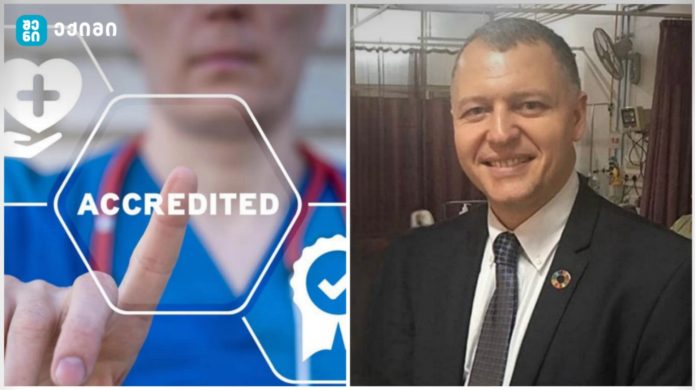Enhancing Healthcare Facility Standards in Georgia – A Perspective by Professor Giorgi Pkhakadze
By: Professor Giorgi Pkhakadze, Chair and Founder of the Public Health Institute of Georgia
In the rapidly evolving landscape of healthcare, ensuring that facilities are both safe and effective has never been more crucial. The Georgian healthcare system, like many others worldwide, faces unique challenges in managing and operating healthcare facilities, particularly in the context of emergency preparedness, infection control, patient experience, and leadership. Drawing on over 25 years of experience in both international and Georgian healthcare systems, I aim to shed light on some of these challenges and propose strategic improvements.
1. Emergency Management in Healthcare Facilities
Healthcare facilities must remain operational during emergencies, and this requires specialized planning. Georgian hospitals, especially those in remote areas, often lack the necessary infrastructure to handle disasters like fires, floods, or power outages effectively. In comparison to global standards, there is a significant gap in the emergency provisions of Georgian facilities. We must ensure that hospitals are equipped with essential electrical systems and have the capacity for both horizontal and vertical patient evacuation when necessary. Continuous staff training on emergency protocols, tailored to our local needs, is also vital.
2. Infection Prevention and Control
One of the most pressing issues in our healthcare facilities is the prevention of infection. In Georgian hospitals, patients are often highly vulnerable to hospital-acquired infections due to compromised immune systems or invasive procedures. Despite efforts, infection control practices still need considerable improvement, particularly in rural areas. We must implement more rigorous infection control measures, educate staff on hygiene practices, and ensure that construction or maintenance work within hospitals does not compromise patient safety. The proper use of personal protective equipment and adherence to infection control protocols is critical.
3. Regulatory Compliance and Accreditation
In 2014, I began advocating for a formal accreditation process for all healthcare facilities in Georgia. Until that time, healthcare facilities operated without any consistent oversight. Thanks to persistent advocacy, accreditation is now compulsory across the country. This ensures that every healthcare institution, regardless of its size or location, meets basic safety and quality standards. However, it is not enough to simply pass inspections; ongoing staff training, especially for facility managers, is necessary to maintain compliance and foster a culture of safety and quality.
4. Improving Patient Experience
Georgian healthcare must prioritize patient-centered care. Often, the physical environment of hospitals—noise levels, cleanliness, and lighting—has a significant impact on a patient’s recovery and overall experience. Many hospitals in Georgia, especially those with limited resources, struggle to meet these basic environmental standards. Improving the patient experience, through simple steps like better communication and maintaining a more healing-friendly environment, is essential. Implementing patient communication models such as AIDET (Announce, Introduce, Duration, Explanation, Thank You) can greatly improve interactions between healthcare staff and patients.
5. The Role of Leadership in Healthcare Facilities
A hospital’s success is largely driven by its leadership. In Georgia, many healthcare facilities suffer from high turnover rates and low morale among staff, often due to insufficient support and inadequate compensation. Strong leadership is critical to fostering a supportive environment that motivates staff to deliver high-quality care. In healthcare, where stakes are high, leadership training is essential not only for hospital administrators but also for department heads and team leaders. They must be equipped to handle the complexities of a dynamic, high-risk environment like a hospital.
The Path Forward: The Role of Accreditation
Accreditation plays a crucial role in the continuous improvement of Georgia’s healthcare facilities. Since 2014, through my advocacy efforts, accreditation has become mandatory for all healthcare facilities in the country. This requirement ensures a baseline level of quality and safety, but our work does not stop there. Ongoing education, regulatory compliance, and leadership development will be critical to ensuring that Georgian healthcare continues to advance, meeting both local and international standards.
Conclusion
As healthcare professionals in Georgia, we are at a pivotal moment in the evolution of our healthcare system. Addressing these five critical challenges—emergency preparedness, infection control, regulatory compliance, patient experience, and leadership—requires coordinated efforts and continuous improvement. The mandatory accreditation process is a step in the right direction, but we must continue to push for higher standards across the board. With the right leadership, education, and commitment, Georgian healthcare facilities can become models of safety, efficiency, and patient care.
Professor Giorgi Pkhakadze,
Chair and Founder, Public Health Institute of Georgia
Advocate for Healthcare Facility Accreditation
ქართული ვერსია
ჯანდაცვის დაწესებულებების სტანდარტების გაუმჯობესება საქართველოში – პროფესორ გიორგი ფხაკაძის ხედვა
ავტორი: პროფესორი გიორგი ფხაკაძე, საქართველოს საზოგადოებრივი ჯანმრთელობის ინსტიტუტის დამფუძნებელი და ხელმძღვანელი
ჯანდაცვის სფეროში, დაწესებულებების უსაფრთხოება და ეფექტურობა განსაკუთრებულად მნიშვნელოვანი გახდა. საქართველოს ჯანდაცვის სისტემა, ისევე როგორც მსოფლიოს ბევრი ქვეყანა, აწყდება გამოწვევებს, რომლებიც უკავშირდება ჯანდაცვის დაწესებულებების მართვასა და ფუნქციონირებას, განსაკუთრებით საგანგებო მზადყოფნის, ინფექციების კონტროლის, პაციენტთა გამოცდილებისა და ლიდერობის საკითხებში. 25 წლიანი საერთაშორისო და ქართული გამოცდილების ფონზე, მსურს წარმოვადგინო ეს გამოწვევები და შევთავაზო სტრატეგიული გაუმჯობესების გზები.
1. საგანგებო სიტუაციების მართვა ჯანდაცვის დაწესებულებებში
ჯანდაცვის დაწესებულებები ყოველთვის უნდა ფუნქციონირებდნენ, განსაკუთრებით კრიტიკული სიტუაციების დროს. საქართველოს საავადმყოფოები, განსაკუთრებით შორეულ რეგიონებში, ხშირად არ არიან სათანადოდ აღჭურვილი ისეთი გამოწვევების გასამკლავებლად, როგორიცაა ხანძარი, წყალდიდობა ან ელექტროენერგიის გათიშვა. საერთაშორისო სტანდარტებთან შედარებით, საგანგებო პირობებში მომზადების მხრივ ჩვენ ჯერ კიდევ ბევრი გვაქვს გასაუმჯობესებელი. აუცილებელია, საავადმყოფოები აღიჭურვონ აუცილებელი ელექტრონული სისტემებით და პერსონალმა გაიაროს მუდმივი სწავლება ევაკუაციის გეგმების შესახებ.
2. ინფექციების პრევენცია და კონტროლი
ინფექციების პრევენცია საქართველოში ერთ-ერთი მთავარი გამოწვევაა. საავადმყოფოებში პაციენტები ხშირად არიან უფრო მოწყვლადი, რაც მათ ინფექციების მიმართ მოწყვლადობას ზრდის. მიუხედავად არსებული ძალისხმევისა, ინფექციების კონტროლის პრაქტიკებს სჭირდება კიდევ უფრო გაუმჯობესება, განსაკუთრებით რეგიონებში. აუცილებელია ინფექციების კონტროლის მკაცრი ზომების გატარება, პერსონალის განათლება ჰიგიენურ პრაქტიკებზე და ინფექციების გავრცელების პრევენციისთვის საჭირო ტექნიკური ღონისძიებების განხორციელება.
3. რეგულირების შესაბამისობა და აკრედიტაცია
2014 წელს დავიწყე ჯანდაცვის დაწესებულებების ფორმალური აკრედიტაციის აუცილებლობის წინ წამოწევა საქართველოში. მანამდე საავადმყოფოები მუშაობდნენ ზედამხედველობის გარეშე. ამ მუდმივი ადვოკატირების შედეგად, დღეს აკრედიტაცია სავალდებულოა ყველა დაწესებულებისთვის. თუმცა მხოლოდ აკრედიტაციის მიღება არ არის საკმარისი; აუცილებელია რეგულარული სწავლება და შესაბამისი ზედამხედველობა, რათა შევინარჩუნოთ ხარისხი და უსაფრთხოება.
4. პაციენტის გამოცდილების გაუმჯობესება
პაციენტების მიმართ ზრუნვა ქართული ჯანდაცვის სისტემის მთავარი პრიორიტეტი უნდა იყოს. პაციენტის გამოსავალზე მხოლოდ მედიცინის ხარისხი არ მოქმედებს, არამედ გარემოც – სისუფთავე, ხმაურის დონე და განათება. საქართველოს ბევრ საავადმყოფოს აქვს რესურსების ნაკლებობა, რაც ამ გარემოს სტანდარტების უზრუნველყოფას უშლის ხელს. აუცილებელია, გაუმჯობესდეს პაციენტთან ურთიერთობა და საავადმყოფოები გახდეს პაციენტისთვის უფრო კომფორტული. ასევე, პერსონალს შეიძლება გააცნოს კომუნიკაციის მარტივი მოდელები, როგორიცაა AIDET (გამოცხადება, გაცნობა, ხანგრძლივობის ახსნა, მადლობა).
5. ლიდერობა ჯანდაცვის დაწესებულებებში
ლიდერობა უმნიშვნელოვანეს როლს თამაშობს საავადმყოფოების წარმატებაში. საქართველოს ჯანდაცვის დაწესებულებები ხშირად იტანჯებიან კადრების ნაკლებობისა და პერსონალის დაბალი მოტივაციის გამო. ეს გამოწვეულია არასაკმარისი მხარდაჭერით და გაუმართლებლად დაბალი ანაზღაურებით. ეფექტური ლიდერობა აუცილებელია, რათა შექმნათ გარემო, რომელიც ხელს შეუწყობს პერსონალის მოტივაციას და პაციენტებისთვის მაღალი ხარისხის სერვისის მიწოდებას. აუცილებელია ლიდერობის სწავლებების განვითარება ადმინისტრატორებისთვის და სხვა დეპარტამენტების ხელმძღვანელებისთვის.
გზა წინ: აკრედიტაციის როლი
აკრედიტაცია მნიშვნელოვანი ნაბიჯია საქართველოს ჯანდაცვის დაწესებულებების გაუმჯობესებისკენ. 2014 წლიდან ჩემი ადვოკატირების შედეგად, ის სავალდებულო გახდა ქვეყნის ყველა ჯანდაცვის დაწესებულებისთვის. ეს უზრუნველყოფს, რომ ყველა დაწესებულება აკმაყოფილებდეს უსაფრთხოების და ხარისხის მინიმალურ სტანდარტებს. თუმცა, ეს მხოლოდ დასაწყისია. აუცილებელია მეტი ძალისხმევა, რათა გავაუმჯობესოთ რეგულაციების შესაბამისობა და დავნერგოთ ლიდერობის სწავლებები.
დასკვნა
საქართველოს ჯანდაცვის პროფესიონალები დგანან მნიშვნელოვან ეტაპზე, სადაც ჯანდაცვის სისტემა ვითარდება. ამ ხუთი ძირითადი გამოწვევის – საგანგებო მზადყოფნა, ინფექციების კონტროლი, რეგულირების შესაბამისობა, პაციენტთა გამოცდილება და ლიდერობა – გადაჭრა საჭიროებს კოორდინირებულ და მუდმივ ძალისხმევას. სავალდებულო აკრედიტაცია პირველი ნაბიჯია სწორი მიმართულებით, თუმცა ჩვენ უნდა ვიმუშაოთ უფრო მაღალი სტანდარტების დასამკვიდრებლად. სწორი ლიდერობით, განათლებით და ერთგულებით, საქართველოს ჯანდაცვის დაწესებულებები შეძლებენ უსაფრთხოებისა და ეფექტიანობის გაუმჯობესებას.
პროფესორი გიორგი ფხაკაძე,
საქართველოს საზოგადოებრივი ჯანმრთელობის ინსტიტუტის დამფუძნებელი
ჯანდაცვის დაწესებულებების აკრედიტაციის ადვოკატი





